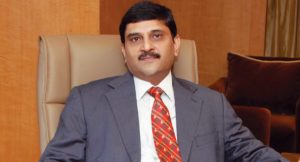Apurva Purohit, the CEO of Radio City, believes in leading by example, a philosophy that she has used in her career that spans more than 25 years. She is also a staunch supporter of diversity at the workplace and her experiences and observations here, helped her find her way into her blog, womenatwork.co.in, and eventually into a book. Her book ‘Lady, You Are Not A Man!’ is all about how women can achieve their way to fulfilling their true potential in any field. Even before the book, she had started talking about this in various platforms or organisations. “I realised that it takes up a lot of my time and the impact made is smaller. But, the book has a large audience and reach. This, along with my blog gives me a far wider reach to convey my thoughts and observations on this topic,” believes she.

In this book, she gives tips on various topics ranging from training husbands and interns to dealing with household crisis and office emergencies, to finding one’s way to grow in the organisation. Her book conveys that, eventually, for women to succeed, it is important for the support system including ones brother, father and husband to support and encourage them. Published by Rupa Publications, this book is also getting translated into several regional languages.
In this interview, she talks to us about her journey as an author and what she aims to achieve through her book.
What made you write the book “Lady, you are not a man!”?
I have come across many women who want to work and also have a well-balanced family life. However, by the time they complete four to five years of their working life, they end up leaving their job. The statistics goes like this: 30 per cent of women enter the work force, 15 per cent stay till mid-management level and 5 per cent reach senior management levels. The 50 per cent drop out that is happening after spending four to five years is a challenge for corporate India. I was trying to figure out why this is happening, especially because organisations are taking extra efforts to hire and retain more women employees today. In the last 10 to 15 years, the desire for diversity has also increased in organisations. But, clearly there is an issue for women and they are figuring out a way to cope and are looking for role models and not finding help. This is how the whole thought of the book came out.
How did you arrive at the name of your book?
We needed to come up with the right name that conveys the essence of the book and is quite catchy. We struggled a lot and finally picked the first chapter title which was “Lady, you are not a man!” and made that the title of the book as it is not about being better but it is celebrating the differences that women bring to the table. It is about recognising your strength as a woman and developing on it in your corporate life.
As we know, today’s working woman wants to make a success of both family and career without compromising on either. But, along with it comes deadlines, family commitments and so on. Through your book, you have shown how a woman can accept, adapt and achieve her way to growth. How much of it is from your personal experience and how much is through secondary research or interviews with others?
At one of the book readings someone asked me how much time I took to write this book – I said, “three months.” One of my ex-colleagues, who was a part of the audience said, “Actually she has been telling us these stories for the last 15 year to 20 years!” In reality, the way I have worked on the evolution of organisations , of teams, or even individuals and helped them grow, has really been through story-telling and anecdotes – be it on organisation culture, values or even teaching people good corporate behaviour. I think people remember stories far better than they remember lectures because they empathise with them. And my book is a culmination of these anecdotes. It is totally my story in the corporate context. Several experiences are obviously in relation to others’ but it is my observation on how I have seen other women struggle which has translated into this book.

Take me through some instances on how has your position as the CEO of Radio City, especially a woman CEO, impacted your book?
If someone asked me if I was treated differently because I am a woman, during my career, I have not experienced anything like that. At the same time, I have seen biases too. But I have not been bogged down by them. But there are many who have been. The idea is to understand how not to get bothered by the biases you see. Ultimately you will be a success or a failure because of the choices you make and what you believe about yourself and not because of how someone else treats you. Several anecdotes in the book are rising above petty stereo types and not thinking of yourself as a victim, being affected by gender issues
What did you aim to achieve by writing this book? And what did it take to put it out to the right ecosystem, working women, for them to learn from?
I feel that the Indian women CEOs who have been there in the system so far have, in some sense, done a disservice to the rest of the women by positioning themselves as role models. And, therefore, making it seem very aspirational. Many people feel that they cannot do it. It is not like those who have made it to the top have any special skill or opportunities. They are just like you and me and it is the choices made by them and their positive attitude that decided their success. You can also do it. Through this book I wanted to highlight that all of us can do what they did.
The book also has a lot of practical tips. While you can call it a woman centric book, it is equally relevant for men also, especially in this age when they too are discovering several more roles they have to play rather than only being the hunter. It is more of a management and human relations book. It is about building relationships both at work and home.
You have spent over 25 years in the advertising and media industry. What kind of changes do you see towards women in the corporate workspace?
When I stepped into the corporate world, there were very few women. As a result, the corporate policies were designed around men. When my son was born, I wanted flexi timing and I had to talk to my organisation for it and that is when they had even come up with the concept of flexi timing.
Twenty years later, corporate India has realised that having women around is important. In fact, diversity encourages profitability. Today, they have put in many more policies and there is a lot of effort in retaining women. There is a talent crunch and you cannot afford to knock off 50 per cent of the population.

There are many professionals who aspire to write. However, writing and more importantly, getting it published is a challenge. How did you overcome these issues?
The whole effort of putting your thoughts into a book looks daunting. But when you start blogging regularly, it introduces you to the habit of writing, improves your language and helps you think and write clearly. If you have an innovative voice and message, then finding a publisher should not be a problem.
What next for Apurva Purohit, the author?
As of now I haven’t thought of anything. My book was about a particular message. I see this book as not as a onetime thing but something which is timeless. If i want to write another book, it will be an expanded version of this book.
QUICK BYTES
Your favourite author: I am a crime fiction reader. Agatha Christie is still my favourite.
Your favourite activity: Reading
Who / what inspired you to write
The desire to help women
How do you deal with writer’s block
I wrote 20 chapters and the next 10 just wouldn’t come. I really struggled. A 24-hour flight journey helped me get rid of it. I wrote three chapters then and then the next 7 flowed.
What takes longer?
Research/introspecting or writing?
Introspecting. Once you are clear about what you want to write, then the rest flows.
A fun anecdote while you wrote the book?
The editing was done my husband. And I have not yet read the published version!
If you were to write a fiction book, what would it be on?
A crime fiction with a romantic touch
What did you realise about yourself that you didn’t know before writing the book?
I realised that I quite enjoyed interacting with the young women I meet while speaking at various platforms.
If you were to anchor a program on Radio City, what would it be?
A retro Hindi song show!
About the author:
Apurva Purohit is one of the very few women CEOs in the media and entertainment industry. She has built several media brands like Zoom TV, Radio City and believes in encouraging diversity of opinion and thought. She is also the independent director on the boards of Mindtree Ltd, the global IT solutions company and Meru Travel Solutions, a radio cab services company and Midday Infomedia. Over the last ten years, she has led Radio City where it has grown from a 4 cities to a channel with presence across 20 cities. Radio City has been voted as the Best Place to Work in Media and is amongst the top 25 great places to Work across industries.




